December 2015, Issue #3
EXTINCTION/DEVOTION
TABLE OF CONTENTS
Editorial
Lise Weil
 Kristin Flyntz
Kristin Flyntz
I. EXTINCTION
Debra Magpie Earling
from The Lost Journals of Sacajewea
Melissa Kwasny
After•Word from Ghost Dance: the Poetics of Loss (Debra Magpie Earling)
Naeemeh Naeemaei
Dreams before Extinction
Deena Metzger
Our Radiant Lives
Mary Sutton
Her Body is Burning
Naomi Shihab Nye
My Grandmother Said
 Netanyahu
Netanyahu
Lena Khalaf Tuffaha
Arrest
Sara Wright
Tree Holocaust
Beverly Naidus
Curtain Call: Portable Altars for Grief and Gratitude
Marilyn DuHamel
Turning Point
Susan Cerulean
Bear Requiem
Margo Berdeshevsky
Our Safe Word
II. DEVOTION
Sharon English
After•Word Our Call to Indigenous Consciousness: Taiaiake Alfred’s Wasáse
Lise Weil
Interview with Ayya Santacitta
Mei Mei Sanford
Serach Bat Asher Speaks
Cynthia Travis
Offerings
Lise Weil
First, a mother: Interview with Megan Hollingsworth of ex•tinc•tion wit•ness
Nora Jamieson
I am Nothing without my Dead
Rebecca Brams
The Bone in My Yard: a Story-Carrier’s Path
Cynthia Anderson
From the Beginning
 Nova
Nova
Anne Bergeron
Calling out the Names
Julie Gabrielli
Song of the Chesapeake
Patricia Reis
After•Word Nora Jamieson’s Deranged
Courtney Cable
After•Word Kenny Ausubel’s Dreaming the Future
Caroline Casey
Beauty from Brokenness: Interview with Lily Yeh
Lise Weil
First, a Mother: Interview with Megan Hollingsworth
of ex•tinc•tion wit•ness
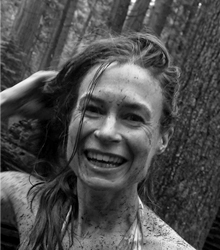 Megan Hollingsworth
Megan Hollingsworth
ex•tinc•tion wit•ness is a collaborative art project with a primary focus on personal and global peacemaking. From February 2014 to September 2015, ex•tinc•tion wit•ness offered creative witness, revolving monthly, with animal and cultural groups being or becoming extinct. At least two electronic posts were offered each month in addition to the production of short poetic films. The 2014 to 2015 monthly witness collection will be available in print 2016. Electronic posts continue now in keeping with the most pressing concerns and emerging regenerative practices.*
Since devoting herself full-time to ex•tinc•tion wit•ness in 2012, Megan Hollingsworth has sold her belongings and depended on the generosity of friends, immediate family members, and food banks for food and lodging.
I first spoke to Megan in July of 2015 when she was living rent-free at the home of a friend in Missoula, Montana. Her son Elias was five and a half years old and the two of them had lived at least three hours apart from one another since January 2014. Megan has since moved to Bozeman where Elias lives with his father. She and Elias are together now on a regular basis.
LW:
As you know, this issue of Dark Matter is partly centered on the theme of devotion. We asked women what they’ve had to give up, what institutions and traditions they’ve had to break from, in order to pursue what matters most to them. Your example is a bit extreme. For example, you’ve broken with the tradition of motherhood in pretty radical ways.
MH:
Indeed I have…
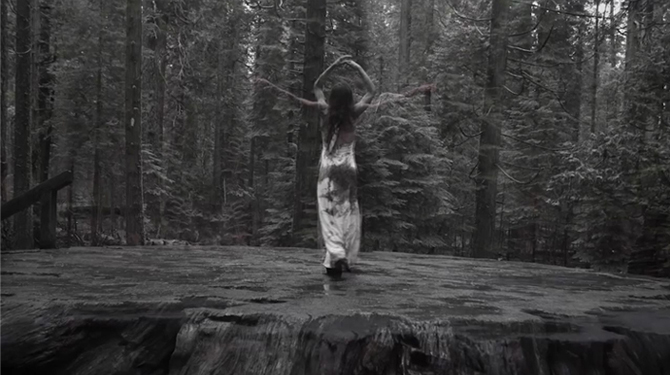 Casting *
Casting *
LW:
Can you give us a bit of the history?
MH:
I founded ex•tinc•tion wit•ness because I knew grief inspired by mass species extinction and genocide is too much for a person to bear alone. Loss of this magnitude is incomprehensible to the mind and thus capable of changing the mind. Whether this change of mind is ultimately destructive or regenerative is determined by many factors and most critically community support. I wanted to celebrate compassionate actions inspired by extreme ongoing loss and support students of ecological studies in a way that academia does not.
ex•tinc•tion wit•ness began with the questions “Who am I?” “What am I here for?” The questions were forced by emotional exhaustion from searching a flooded job market August through December 2011. My son Elias was two years old then. I’d been fired from a salaried position in Development at Naropa University in Boulder Colorado. I had joined a faction of staff and students speaking for coexistence with prairie dogs, who were at risk of losing their homes on the Nalanda campus in the interest of Naropa’s building plans. I was uncomfortable fundraising for the University and I was open about my discomfort. The job loss left my family without any income, so we moved back to the house we still owned in Livingston Montana and my husband, Charles, accepted a job offer three hours’ drive away in Cody Wyoming. The separation meant in part that I claimed more time for myself and returned to my passion for grief and peace work, which was reignited by the Nalanda Campus prairie dogs. The marriage did not survive the separation and my passion.
LW:
Readers won’t be as surprised that you separated from your husband as they may be that you separated from your son.
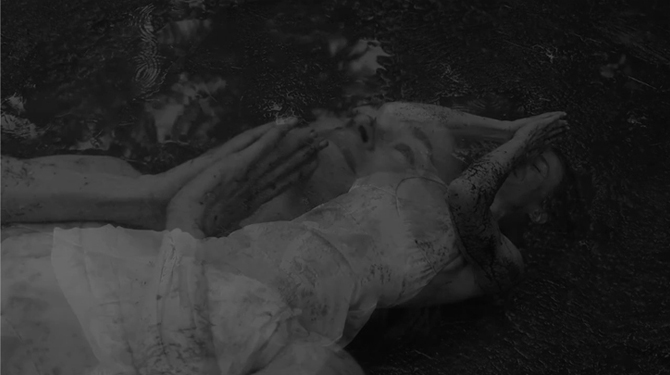 Devotion *
Devotion *
MH:
The choice wasn’t to separate from Charles or Elias, it was to return and live true to myself and my calling. The separation from Elias had everything to do with the urgency of this time coupled with my passion and knowing that it's possible for the human mind to change, regenerate. That's what originally made me okay with placing Eli in the hands of his father so that I could be a free voice for healing, for peace.
In December 2012, I experienced a shockwave of light energy move from my sacrum to my crown during orgasm accompanied by a raging scream. I was alone in bed and had just read the story of a 300-ft diameter giant sequoia cut in 1853 as told by Paul Hawken in Blessed Unrest. The giant sequoia had been encountered by a man chasing a wounded grizzly during the California gold rush. The tree was cut for ‘show and tell’ a year later. The cutting sparked outrage that helped to spur the establishment of National Forests and National Parks.
My activist background is in forest protection. I’d wept for many trees and I’d walked among the giants. I knew that forest. Yet the tears weren’t coming. I couldn’t grieve or sleep, so I pleasured my body and then came the wail along with the light. That light wave was to be the beginning of a spiritual walkabout. I was propelled into a healing process that I only saw clearly once I was through. My devotion was to spirit.
If children weren’t being trained to hate and kill other children and if people and other animals weren’t starving and if everyone were sheltered, if the world were peaceful, I would be able to devote more of my attention to my own and my own child’s emotional needs. But my life is not about me anymore.
You know, I’ve seen a lot of contradiction between message and behavior in the ecology and environmental studies community. Individuals write about how materially driven culture is insane and then continue on the same track. It’s not easy to discern what is enough when you have been raised in more than enough while others have none. To live something that is simply enough looks or is perceived to be extreme…
LW:
It isn’t just a matter of perception because what you’re living is difficult. It’s not for everyone. We’re spoiled people.
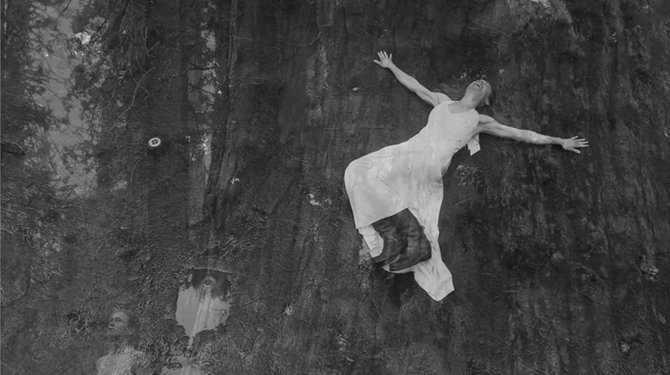 Grieving Giants *
Grieving Giants *
MH:
I am first a mother. I am really a homebody. A homemaker. I enjoy taking care of a home and those who live there. I appreciate furnishings, cleanliness and order. With the witness, I have sacrificed this enjoyment and done so willingly because the lives of other mothers, of all walks, are disrupted as they are displaced from their homes. This violation is far from new. The soil I was born to in Indiana bleeds of it. I want to help heal old and fresh wounds while preventing more. There is sorrow in my own transience, but not as great as the sorrow and solidarity I feel with refugees, be they human or nonhuman.
I write and pray because I want to help prevent other women from having to separate from their children. A parent parting from their child to answer a spiritual calling is a sign that something culturally or socially is unaligned with truth and goodness. I refuse to be silent and just go about my life as other women and children are raped and killed and families are torn apart in a system that enslaves everyone. I write and pray because I want everyone to know the comfort of shelter and sustenance naturally provided by an intact ecological community. Everyone is provided for by an intact community, which is comprised of intact individuals. By intact, I mean spirit and soul connected. I mean everyone is doing the thing they were born to do, tending to those they are responsible for, first and foremost themselves.
Elias is frustrated when I tell him that a lot of kids in the world his age work. He happens to have been born to a mother who can’t stand that her life has been made possible by, for example, sanctions on Iraq. I know the cost of the material excess, I know what is behind all of this. And to know that and live that knowing is who I am. I believe the best that I can do for Elias is be the mother he was born to. As long as I am living out of this privilege and out of this violence, I will use my voice for personal and global peacemaking.
I feel I have a job, I’m doing a job. I have let go of material attachment in order to be able to do my job and all the while I have been sheltered and fed. I have learned the way the world works through showing up, staying open, giving and receiving.
LW:
So far in ex•tinc•tion wit•ness I’ve only seen writing about animals, not human slavery or exploitation. Is that in there too?
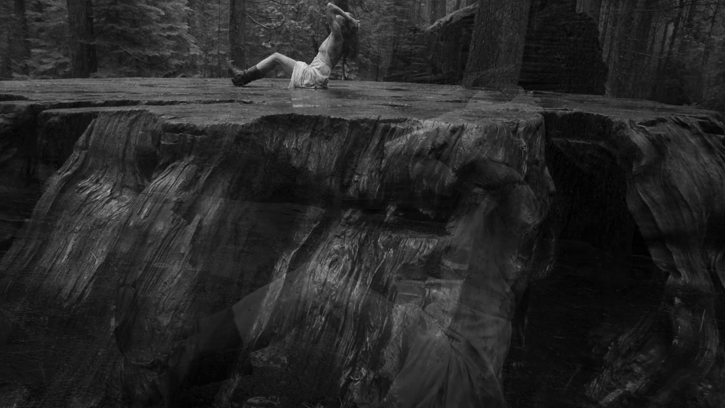 Inside and Out *
Inside and Out *
MH:
I write human slavery and exploitation into the letters. If white women had not been vitiated and burned we would never have seen the violation of other women and their children. Had women been listened to all along, respected for our intelligence and guidance, our sensitivity and sensuality, genocide in its commonly understood form and in the form of ecocide would not have been allowed.
All of this competition, all of this need for ownership, this greed stems from insecurity, the thought that if I don’t take this someone else will, or I must take this to get what I really want, which is the woman or the man. That thought is born of scarcity resulting from the degradation of women and our caring ways, in which women have been complicit for the sake of security. You could call this poaching or taking mentality Western mind or even human nature except it is not located anywhere in particular and it is not present among lasting indigenous groups. It’s a fear-based mentality that is rather pervasive now and threatens the last remaining intact people and forest.
LW:
The subjects you take on in ex•tinc•tion wit•ness are pretty bleak. What draws you to this work? What’s the positive spark?
MH:
The positive spark is sharing what’s surfacing in response to the loss: creative genius, connection and togetherness. And having the experience of oneness in my own being. People say “you can’t hold the whole world.” Well it’s possible. It’s painful, but it’s possible. And I believe we do whether we acknowledge it or not. Acknowledging the pain allows something creative, helpful to come of it. Otherwise, there is depression and addiction.
There is this horrible foreground noise—war, genocide, global climate change. How do I make peace with my comforts? How do I help relieve the suffering rather than contribute to it? For me, it’s the voice. It’s the writing. It’s being free to play and smile. Compassion is happiness. And I’m probably one of the happiest people on the planet. I don’t have a thing of much material value to my name. But I appreciate my life, that I’m honest about being in love with life and everyone living and how much it hurts to see others suffer, destroy themselves and one another.
I feel that my compulsion to speak for world peace is greater because I have a child in the world. If humans keep fighting each other, we’re done, finished, because it draws attention from the regenerative work that needs to happen. I could spend every day with Elias and love him up and down and it wouldn’t change the fact that without world peace and an immediate response to mass species extinction and subsequent global climate change there is no conceivable future for him and other children. An overwhelming regenerative response is not happening yet. So, I am extremely restless.
Grief is not bleak, grief is beautiful. Grief in response to genocide and mass species extinction belongs to everyone. The grief and the loss are communal. A lot of people look at the loss and say it’s too depressing. But, really, what’s depressing is not looking at the loss. Basically, what I am saying with this project is I want to hold your hand. That’s the invitation with ex•tinc•tion wit•ness, let’s be together in this because we are together in this.
I saw clear-cuts of the Pacific Northwest in person for the first time in 1998. I knew then that to call for cutting the forest like that, a man must be severed from himself, severed from his own rhythms. Earlier this year, with witness to Pacific dying, I honed in on what we’re grieving by going there myself. It’s really the loneliness. We’re grieving lost connection, not disconnection from something outside ourselves that many call nature, but something within ourselves that is natural, that is spirit and soul wedded. And it’s that disconnection that’s driving genocide and accelerated species extinction.
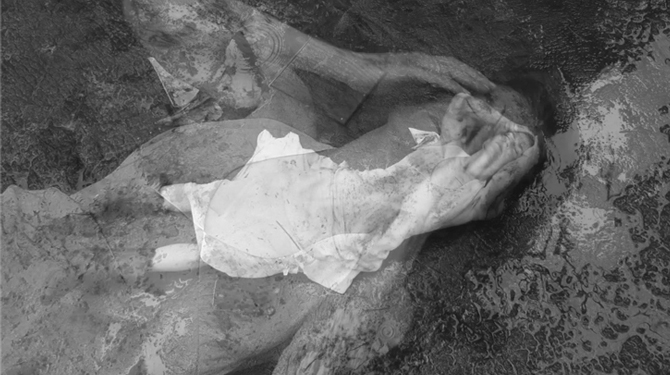 Dreams In The Dark *
Dreams In The Dark *
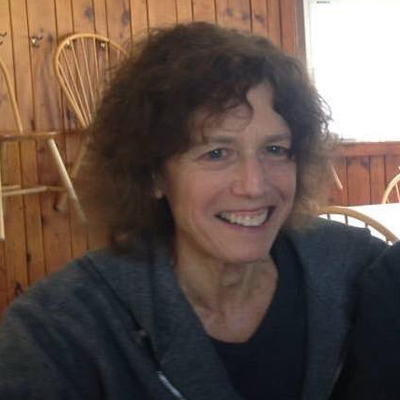
Lise Weil - was founder and editor of the US feminist review Trivia: A Journal of Ideas (1982-1991) and co-founder of its online offshoot Trivia: Voices of Feminism, which she edited through 2011 and which is now published by an editorial collective at the University of Arizona ( www.triviavoices.com ). She recently completed a memoir, In Search of Pure Lust, centering on the tension between the grand experiment of lesbian-feminism of the ‘70s and ‘80s, in which she was a fervent participant, and her later immersion in Buddhist practice. In 1990, she left Western Mass. for Montreal, where she has lived ever since. She teaches in Goddard College’s Graduate Institute.
Want to comment on any Issue of Dark Matter, fill out the form here.
Copyright © 2014-2021 Dark Matter: Women Witnessing - All rights reserved to individual authors and artists.
Email: Editor@DarkMatterWomenWitnessing.com
Please report any problems with this site to webmaven@DarkMatterWomenWitnessing.com
